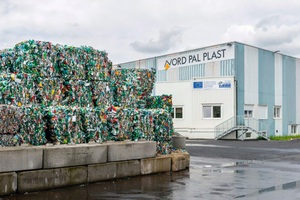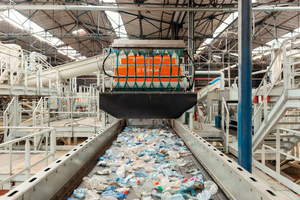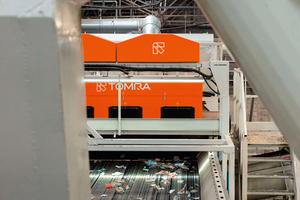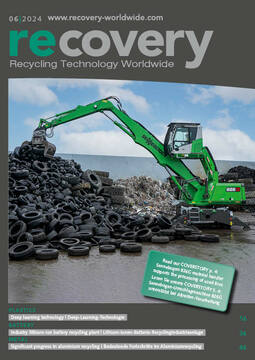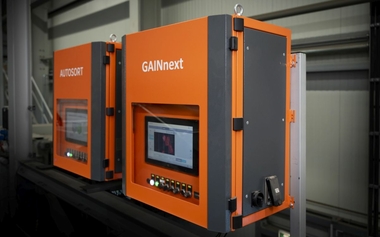Optimising the purification process of rPET production
Nord Pal Plast (NPP), a France-based subsidiary of the European group Dentis that specializes in producing recycled PET flakes derived from post-consumer plastic bottles, was the first to test TOMRA’s PET Cleaner application. Thanks to the AUTOSORT™ with GAINnext™ deep learning technology, NPP is able to separate clear and light blue transparent bottles from hard-to-detect white opaque bottles to create a clean PET bottle stream.
Regulatory change demands innovation
Under the Circular Economy Law, France has set an ambitious target of recycling 100 % of plastics by 2025. To achieve this, consumers nationwide received instructions to sort household packaging waste into separate paper/carton, metal, and plastic bins. To meet the demands of these regulatory changes and increase the volume of recycled plastic content available to the market, NPP initiated a project with TOMRA’s Recycling division in 2022.
Even with conventional sorting technologies, creating a pure recyclable PET fraction was challenging due to hard-to-detect plastic contaminants, such as multilayer packaging. Milk bottles in France, for example, are often composed of multiple layers of different colored plastics, with the outermost white layer containing titanium dioxide that provides UV protection. While producer responsibility organizations like the French Eco-emballages have called for reducing opacifying colorants in PET1, these materials are abundant in waste and need to be separated from the target fraction using the most advanced sorting technologies.
Partners join forces
Together with the research and development engineers at TOMRA, NPP tested the deep learning-based application for purifying PET on their sorting lines. TOMRA software engineers trained the AUTOSORT™ with GAINnext™ deep learning technology to detect opaque PET objects, foils, textiles and films that are considered contaminants when producing rPET.
“With our GAINnext™ application, we have targeted the separation of white opaque PET from clear PET, which was previously difficult to solve with traditional technology”, explains Amed Tuwi, Application Developer Deep Learning at TOMRA Recycling Sorting. As project leader for the new GAINnext™ application, Tuwi commented: “NPP is a highly recognized and forward-thinking player in the industry. They were a great collaborative partner to test our PET Cleaner application on an industrial scale, allowing us to make it available to the entire market.”
Following this successful collaboration and additional testing, TOMRA launched its PET Cleaner application for GAINnext™, along with other solutions such as food-grade vs. non-food-grade plastic sorting applications, to the global market in April 2024.
PET cleaning on an industrial scale
In operation since 2003, NPP is a PET bottle recycling company, with a processing capacity of 40 000 metric tons of PET bottles per year. Specializing in clear and colored PET bottle recycling, NPP has used TOMRA sorting technology for over 12 years. The company’s sorting plant in Lesquin features six AUTOSORT™ machines, two of which have been equipped with TOMRA’s GAINnext™ deep learning technology to enhance the PET cleaning process as part of the collaboration.
One AUTOSORT™ with GAINnext™ purifies the PET bottle input stream from contaminants. The second machine with deep learning technology recovers recyclable PET bottles from the first sorting step. This solution based on the powerful combination of deep learning software and cutting-edge sensors makes it possible for NPP to create a mono-fraction of transparent PET with outstanding purity levels.
Building a competitive edge with technology
Not only has the deep learning technology significantly improved NPP’s purity levels of clear PET, but it also allowed them to expand their operations and create new revenue streams. With the PET application, the company can recycle white opaque PET bottles with UV barriers and easy-to-separate body sleeves – items found in supermarkets nationwide.
“The deep learning application for PET cleaning halves the final residual contamination, and we are achieving 100 ppm contamination. What‘s more, this is achieved with a minimum number of machines – an investment that really pays off when it comes to operating costs”, comments Frédéric Durand, Managing Director of TOMRA France.
After successfully implementing TOMRA’s deep learning technology to achieve higher purity levels of secondary raw materials, NPP has been selected by Citeo in its national tender as a trusted industrial partner to operate the recycling of PET bottles.

